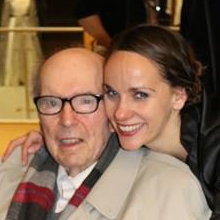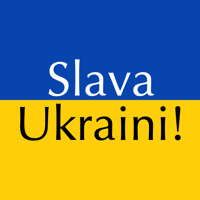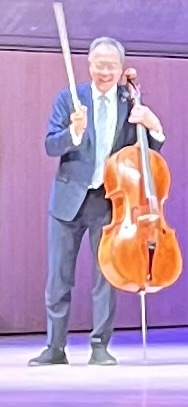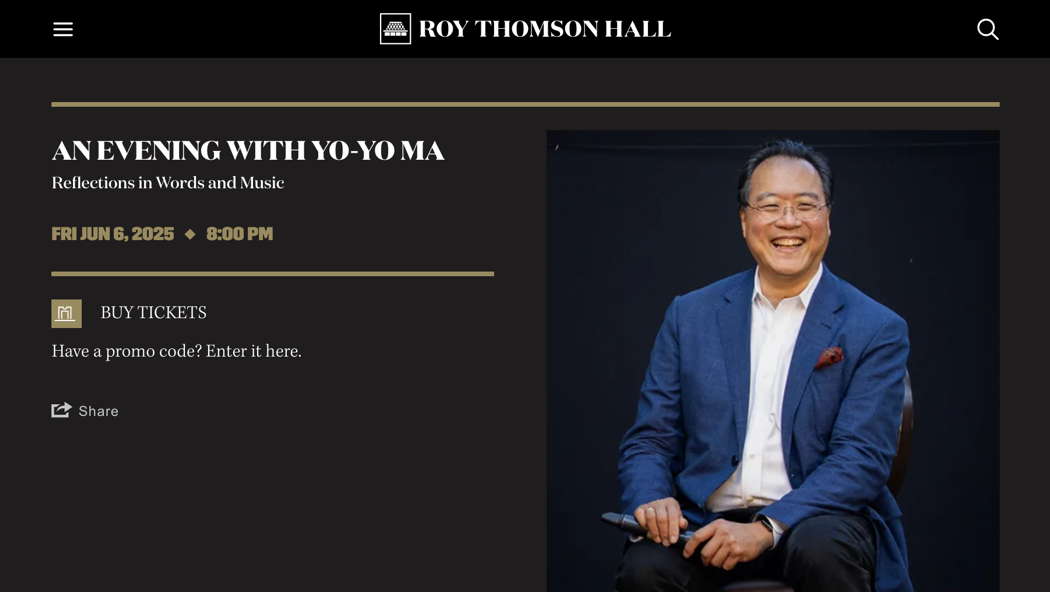- Petr Altrichter
- Desmond Ratcliffe
- Giya Kancheli
- Weinberger
- Andreas N Tarkmann
- Eastern Europe
- Pericles Makris
- Dialectiae Piano Trio
 SPONSORED: Ensemble. A view from the pit - John Joubert's Jane Eyre, praised by Alice McVeigh.
SPONSORED: Ensemble. A view from the pit - John Joubert's Jane Eyre, praised by Alice McVeigh.
All sponsored features >>
 VIDEO PODCAST: Slava Ukraini! - recorded on the day Europe woke up to the news that Vladimir Putin's Russian forces had invaded Ukraine. Also features Caitríona O'Leary and Eric Fraad discussing their new film Island of Saints, and pays tribute to Joseph Horovitz, Malcolm Troup and Maria Nockin.
VIDEO PODCAST: Slava Ukraini! - recorded on the day Europe woke up to the news that Vladimir Putin's Russian forces had invaded Ukraine. Also features Caitríona O'Leary and Eric Fraad discussing their new film Island of Saints, and pays tribute to Joseph Horovitz, Malcolm Troup and Maria Nockin.
Reflections in Words and Music
ANDREA RUSH, in her first review for Classical Music Daily, describes an evening with Yo-Yo Ma
On my way out of Roy Thomson Hall (Ontario, Canada) this weekend, I overheard a comment: 'That was more like hanging out in Yo-Yo Ma's living room than sitting in a concert'.
I agree.
Using words and music, Yo-Yo Ma grappled with the question 'what defines us as a species?' The hard line dividing artificial intelligence and emotional intelligence could not have been clearer.

Yo-Yo Ma at Roy Thomson
Hall on 7 June. Photo
© 2025 Andrea Rush
Words
The first part of the program began with the module 'ask me anything'. From the stage, Mr Ma took questions from avid fans. Musicians at all stage of their careers sought guidance. It was a masterclass on music and the universal search for meaning in life. His insights are treasures.

Online publicity for 'An evening with Yo-Yo Ma'. Yo-Yo Ma photo © Austin Mann
Asked whether he feared 'memory loss', he spoke of 'muscle memory'. As a musician, Mr Ma is well-known for exercising the greatest muscle of all, his heart. He counselled students to memorize the structure, sequence and organization of a musical work as a road map to avoid getting lost during a performance.
Asked by an audience member facing an important competition whether he ever felt like 'smashing his cello', he responded that he has many times. He tempered his response with humour, adding that there are only so many cellos to smash, so that isn't a practical way to deal with frustration. He likened coaxing a sound from the instrument to tending to a pet or a garden.
An audience member here shared bewilderment as to why she had left the cello for years and suddenly felt a need to return to it. She asked whether there would be any risk in starting again. He explained that a relationship to a cello is like personhood. Each person must find their way to overcome their relationships - to themselves, to the world and similarly to their instrument. Kindly, he encouraged the student to take comfort by acknowledging that human brain space and human capacity to love and care, are unlimited.
Asked to recall a high point in his career, he spoke of the joys of communicating with children. He marvelled at the skillset, knowledge and creativity that go into family television programming. He gave examples of edutainment in which he played - Arthur, Sesame Street and Mr Rogers.
Commenting on music as therapy, he recommended playing music with others as a way to develop relationships and match sounds with souls.
Music
What better way to open a program than the Prelude from J S Bach's Cello Suite No 1. Mr Ma's recordings and performances of this work are legendary. Torontonians love the suites, which have also been recorded by local Toronto Symphony Orchestra principal current and former cellists including Joseph Johnson, Winona Zelenka, and Daniel Domb, whose brilliant recordings continue to sell all over the world. From the very first breath, the sounds filled the hall and enveloped the audience like a warm bath. It is a work of timeless joy, played with the emerging freshness of spring flowers. Light and airy, he exuded Bach's majestic structure with joy.

American cellist Yo-Yo Ma was born in 1955 in Paris to Chinese Parents.
Photo © Austin Mann
In a contrasting mood, further in the program, Mr Ma chose the complete Suite No 5, a sombre work. He played emotionally, exuding grief. What better way to express sadness than the fifth Bach Cello Suite. Later in the program he played the sixth Bach Cello Suite Prelude. He chose a tempo which was majestic. This is Bach's last suite. It is a challenging work technically. Described as ascending to heaven, it was a good fit for a program that emulated the sounds of nature, featured photos of the earth and the planets, and ended with a prayer.
The program followed an autobiographical sequence, pairing music to events that marked his life. Yo-Yo Ma described the sheer terror he and those surrounding him had experienced growing up. He chose Shostakovich's Sonata for Cello and Piano in D minor to convey the terrifying implications of heartless cruelty. The choice was well thought out - having been written during a period of turmoil. Then followed Bloch's Prayer for cello. This work continues to find a place on programming by the great contemporary cellists, including Stephen Isserlis and Sheku-Kanneh Mason. Sadly, it speaks to our time. It was played beautifully.
One of Yo-Yo Ma's hallmark gifts as a musician is the ability to communicate with every culture, in every style. The repertoire he chose underscored this gift. He played selections from Astor Piazzolla, from Bill Strayhorn and George Gershwin. He played a J S Bach Bourrée in the style of a fiddler, and used the cello to copy the sound of a train whistle dipping into Bill Strayhorn's Take the A Train. He slid his fingers lightly over the four strings toward the bridge to imitate the sounds of nature. Amir Siraj's pre-recorded accompaniment of Yo-Yo Ma was one of the highlights of the program. The two musicians have performed works by Arvo Pärt and David Bowie in other venues. Interviews of Mr Siraj on YouTube are well worth watching.
The program closed with a reading from A Brave and Startling Truth by Maya Angelou followed by the singing of the traditional Dona Nobis Pacem which the audience sang while Yo-Yo Ma stood on stage bowing his cello as a double bass, gazing into and praying for the future of humanity.
True music therapy, gifted with love.
Copyright © 9 June 2025
Andrea Rush,
Toronto, Canada



